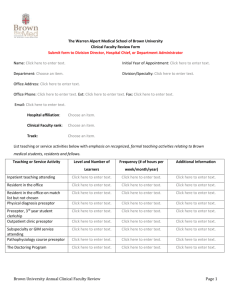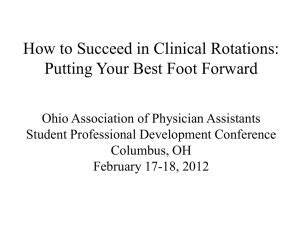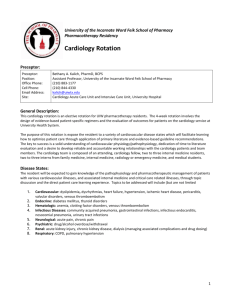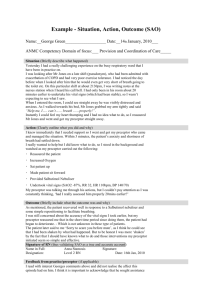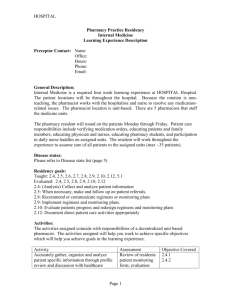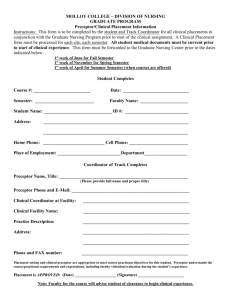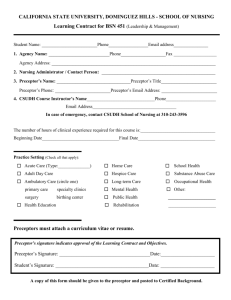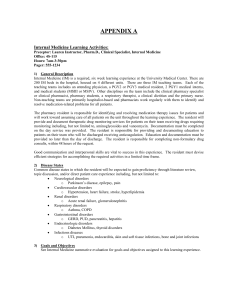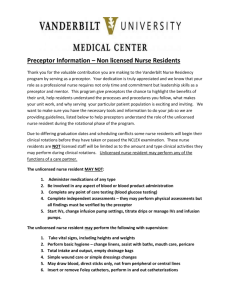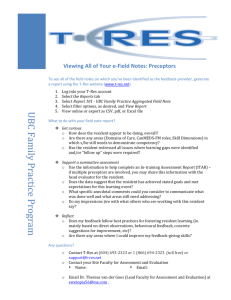Internal Medicine Learning Experience Description Preceptor: Don
advertisement
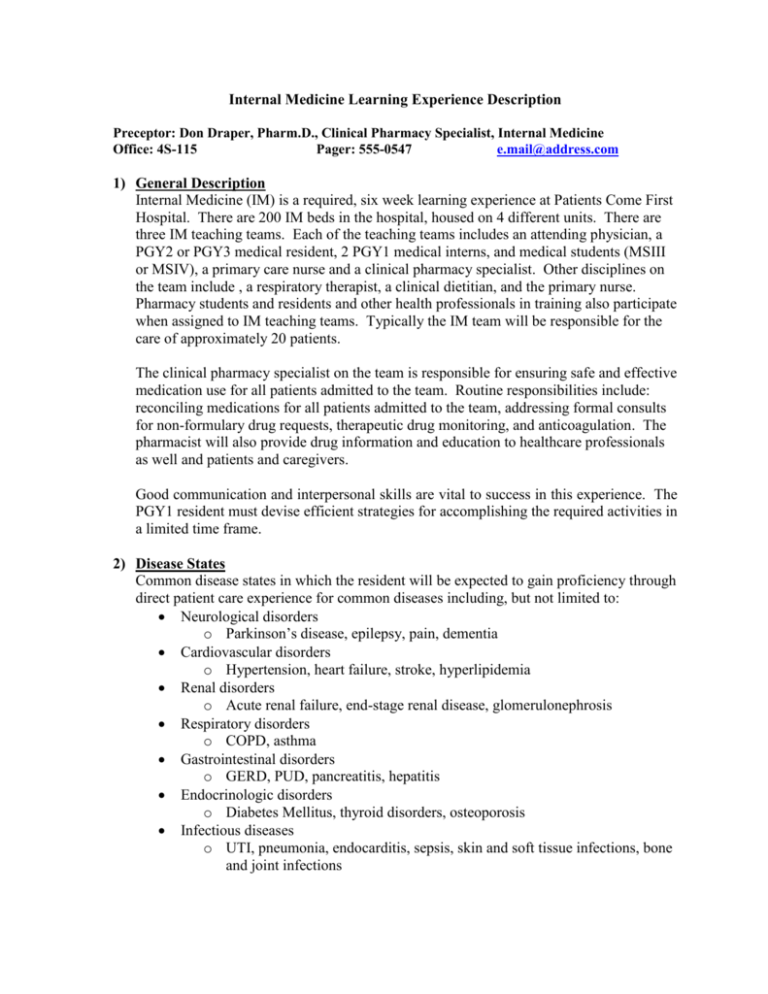
Internal Medicine Learning Experience Description Preceptor: Don Draper, Pharm.D., Clinical Pharmacy Specialist, Internal Medicine Office: 4S-115 Pager: 555-0547 e.mail@address.com 1) General Description Internal Medicine (IM) is a required, six week learning experience at Patients Come First Hospital. There are 200 IM beds in the hospital, housed on 4 different units. There are three IM teaching teams. Each of the teaching teams includes an attending physician, a PGY2 or PGY3 medical resident, 2 PGY1 medical interns, and medical students (MSIII or MSIV), a primary care nurse and a clinical pharmacy specialist. Other disciplines on the team include , a respiratory therapist, a clinical dietitian, and the primary nurse. Pharmacy students and residents and other health professionals in training also participate when assigned to IM teaching teams. Typically the IM team will be responsible for the care of approximately 20 patients. The clinical pharmacy specialist on the team is responsible for ensuring safe and effective medication use for all patients admitted to the team. Routine responsibilities include: reconciling medications for all patients admitted to the team, addressing formal consults for non-formulary drug requests, therapeutic drug monitoring, and anticoagulation. The pharmacist will also provide drug information and education to healthcare professionals as well and patients and caregivers. Good communication and interpersonal skills are vital to success in this experience. The PGY1 resident must devise efficient strategies for accomplishing the required activities in a limited time frame. 2) Disease States Common disease states in which the resident will be expected to gain proficiency through direct patient care experience for common diseases including, but not limited to: Neurological disorders o Parkinson’s disease, epilepsy, pain, dementia Cardiovascular disorders o Hypertension, heart failure, stroke, hyperlipidemia Renal disorders o Acute renal failure, end-stage renal disease, glomerulonephrosis Respiratory disorders o COPD, asthma Gastrointestinal disorders o GERD, PUD, pancreatitis, hepatitis Endocrinologic disorders o Diabetes Mellitus, thyroid disorders, osteoporosis Infectious diseases o UTI, pneumonia, endocarditis, sepsis, skin and soft tissue infections, bone and joint infections Topic discussions and reading key articles will be used to help develop the resident’s patient care skills for common disease states or acquiring knowledge about diseases seen infrequently on the service. 3) Activities The activities assigned to this learning experience reflect the activities a pharmacist working in this environment are expected to be able perform. These activities were also selected to help you work toward achieving specific objectives which in turn will help you achieve the goals assigned to the learning experience. The table below demonstrates the relationship between the activities you will perform on the learning experience and the goals/objectives assigned to the learning experience. Activities Accurately gather, and analyze patient specific information using an organized data collection method (standard data collection template or form approved by the preceptor) on assigned patients prior to pre-rounds with preceptor. Actively participate in IM team rounds daily. Based on potential medication related problems identified by working up patient prior to rounds, be prepared to: Provide and document therapeutic drug monitoring services for patients receiving drugs requiring monitoring including, but not limited to, aminoglycosides and vancomycin per Therapeutic Drug Monitoring (TDM) consult Complete formal consults for non-formulary drugs, recommending formulary, cost-effective alternative drug therapy to health care providers when appropriate Accurately reconcile medications upon admission, transfer and discharge. Identify and resolve discrepancies including, omissions, duplications, contraindications, unclear information, and changes. Compose an accurate, concise progress note documenting direct patient care activities within the required time frame. Provide drug information for patients, caregiver, and/or healthcare members. Write up at least 1 referenced drug information responses. Identify and report adverse drug reactions and/or medication errors. Provide concise handouts for weekly educational topics and present to IM team. Educate at least five patients on new medications and potential adverse drug reactions 4) Preceptor Interaction Daily: 8:30 - 9:30 Pre-rounds with resident 1:00 – 2:00 Preceptor available in office for topic discussions, reviewing progress notes, patient updates, etc. 5) Communication: A. Daily scheduled meeting times: Residents to prioritize questions and problems to discuss during scheduled meeting times as listed above. B. E-mail: Residents are expected to read e-mails at the beginning, middle and end of each day at a minimum for ongoing communication. This is appropriate for routine, non-urgent questions and problems. C. Office extension: Appropriate for urgent questions pertaining to patient care. D. Pager: Residents to page preceptor for urgent/emergency situations pertaining to patient care E. Personal phone number: Provided to resident at time of learning experience for emergency issues. 6) Expected progression of resident responsibility on this learning experience: (Length of time preceptor spends in each of the phases will be customized based upon resident’s abilities and timing of the learning experience during the residency training year) Day 1: Preceptor to review learning activities and expectations with resident. Week 1: Resident to work up approximately 1/3 of the team’s patients and present to preceptor daily. Preceptor to attend and participate in team rounds with resident, modeling pharmacist’s role on the health care team. Week 2: Resident to work up approximately half of the team’s patients and discuss problems with preceptor daily. Preceptor to attend team rounds with resident, coaching the resident to take on more responsibilities as the pharmacist on the team. Weeks 3-6: Each week the resident is expected to take over the responsibility of working up more of the team’s patients, continuing to discuss identified problems with preceptor daily. Once the resident is able to take responsibility for all patients assigned to the team, the preceptor will no longer attend team rounds, but will continue to facilitate the resident as the pharmacist on the team.
